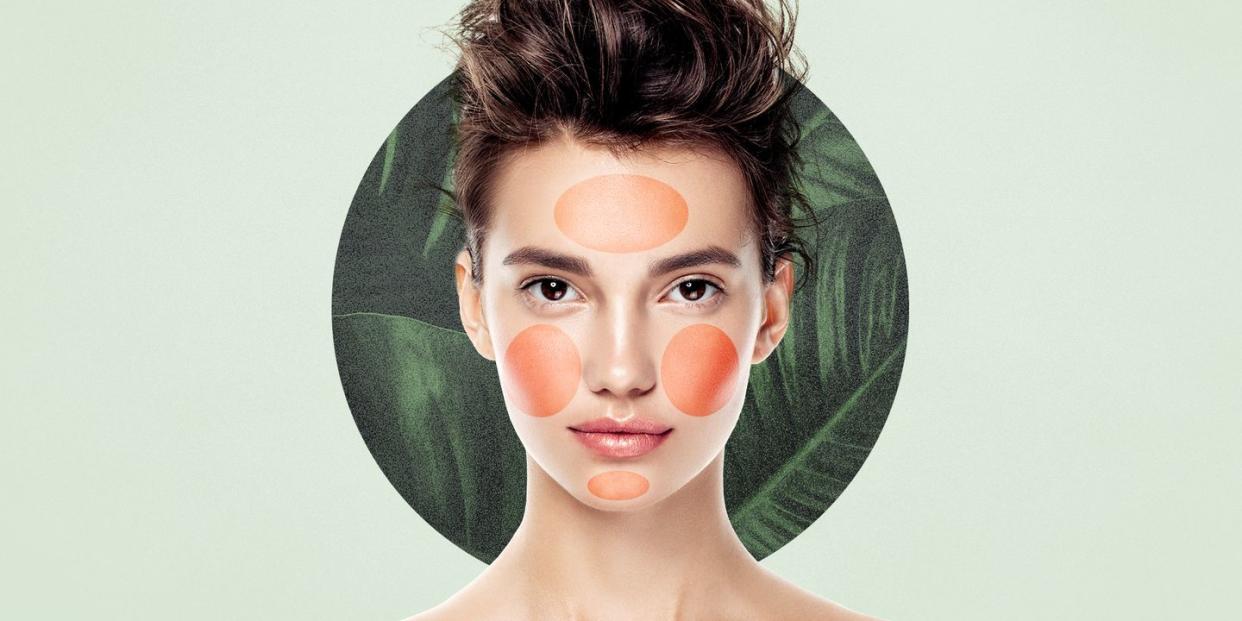Rosacea Remedies of the Natural Variety, Just In Case You're Experiencing a Flare

Rosacea tends to be like the red-haired stepchild of the dermatological world. It’s extremely common (16 million Americans suffer from it), but it's not nearly as frequently discussed as acne or aging. There are three main subtypes of rosacea that affect the skin, says Manhattan dermatologist Marnie Nussbaum (@marnienussbaum), all of which can be treated medically: The most common form, Erythematotelangiectatic rosacea (ETR), characterized by redness and broken blood vessels, can be quelled with prescription topical Soolantra; phytamous rosacea, which is most common in men and manifests in bumpy skin around the nose (think W.C. Fields), responds well to CO2 lasers; and papulopustular, often mistaken for acne, can be addressed with low-dose antibiotics. But all of them, Nussbaum says, can respond to natural approaches as well—and you might want to try some of those tactics first.
“Rosacea is triggered by myriad factors such as stress, hormones, and genetics, as well as exercise, medications and even changes in temperature, alcohol and spicy foods,” Nussbaum says. “If you are able to pinpoint your individual trigger, eliminating that from your daily routine may mitigate flares.”
Palm Beach facialist and holistic skincare founder Tammy Fender, who ministers to the complexions of many a rosacea-prone client, says that it’s important to remember that the skin responds to both external and internal conditions, and can be the first place for imbalances to register. “Beautiful, radiant skin is the result of a balanced lifestyle, and encompasses our emotional state and spirit,” she says. “I like to remember that rosacea is a condition, and it’s treatable. With tender care and some simple shifts in daily patterns, I’ve found that usually it can be cleared very naturally.”
Here, a few easy steps that might help take the red out.
Watch Your Diet
“Skin can react with inflammation and redness when encountering chemicals, whether topically or through the foods we eat,” says Fender. “Processed foods, and foods that are high in sugar, can contribute to inflammation. Limiting caffeine and alcohol can also help clear rosacea. In general, I recommend a diet that includes more raw organic vegetables and fruits. Seek out foods, such as avocado and coconut, that are high in essential fatty acids, providing soothing nutritive support.”
To home in on the precise food, beverage, or spice that ignites a rosacea episode, Nussbaum suggests keeping a food diary. “A flare typically occurs 15 minutes after eating or drinking a trigger,” she says.
Tweak Your Skincare Regimen
“Those with rosacea often have sensitive skin, so certain potent skincare ingredients (think alpha hydroxy or beta hydroxy acids, retinol, etc.) may also cause flare-ups,” says Nussbaum. Try to be extra gentle when washing, and avoid harsh or abrasive scrubs. “I'd suggest looking at whatever face care products you use currently with a critical eye,” says Fender. “You might take a break from any that use non-natural ingredients for several weeks.” The same chemical-avoidance is true for SPF, too: “Since those with rosacea are more sensitive to sunlight, it’s critically important that they wear a broad-spectrum sunscreen (minimum SPF 30),” says Nussbaum. “I always recommend mineral based sunscreen for my rosacea patients, as minerals sit on top of the skin and block the rays while chemical sunscreens penetrate the skin and can irritate rosacea prone skin.”
Seek Out Anti-Inflammatory Natural Alternatives
“Since Rosacea is an inflammatory condition, in traditional herbalism we turn to plant remedies that help soothe the skin, including Matricaria to calm inflammation, and Rose Hip and Helichrysum to stimulate renewal,” says Fender. “Marshmallow root is a favorite, as it helps detoxify the skin and provides a great source of vitamins and minerals that help reduce redness and irritation.” Fender's Plant Milk, which was developed specifically for sensitive and rosacea-prone skin, contains white lily milk, milk thistle, arnica, and coconut milk.
Nussbaum advises looking for fragrance-free products containing antioxidants such as green tea, niacinamides, and ceramides, all of which have been proven to decrease redness and improve the skin’s barrier. “Natural calming ingredients like cucumber and chamomile extract can reduce redness and irritation,” she says. “Turmeric-containing creams are also powerful anti-inflammatory products that can help with flares.”
Manage Stress
Stress and anxiety cause the kind of systemic inflammation throughout the body that can kick rosacea into high gear, and a lack of shut-eye directly affects the skin’s ability to repair itself and remain resilient. “Skin sensitivities and good sleep are deeply connected, “says Fender, “One of the simplest changes—thought not always the easiest—is to get more sleep, and as close as you can to 8 hours a night. That said, anything you do that reduces your stress—laughing, writing poetry, running, gardening—these all help improve your skin, because when you are happy, it affects your physical wellbeing.”
Cut Yourself Some Slack
As we’ve all learned recently, life can be unpredictable. We have a lot to cope with, and nobody’s perfect (nor is anyone’s skin). Because rosacea is so reactive to our environment and our emotions, it can be especially tough to control in an out-of-control world. Still, says Fender, don’t despair. “Sometimes, when there are big life changes, we can all slip off course, and the best diet, sleep, and exercise fall by the wayside. That’s perfectly normal,” she says. “It’s important to remember that there’s always a way back into balance. While healing the skin I’d suggest avoiding any extremes—physical, emotional, or atmospheric, which might include sun exposure, extreme heat, or swimming in a chlorinated pool, for example. Just set an intention to heal the skin, make a plan, and please be patient with yourself.”
You Might Also Like

